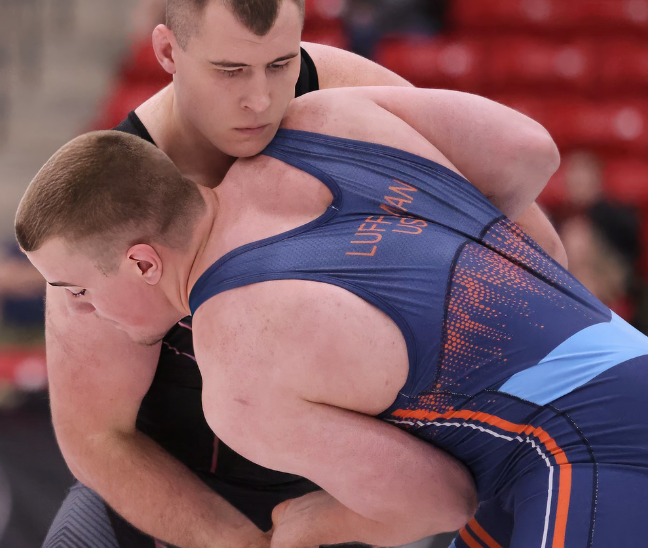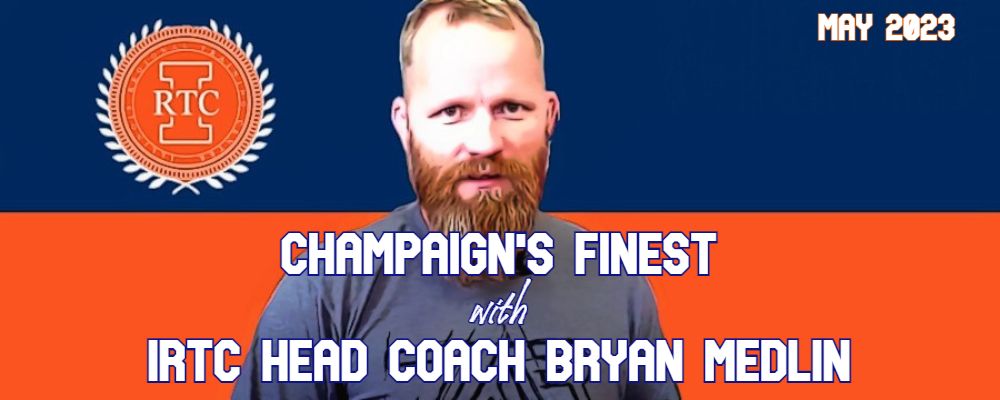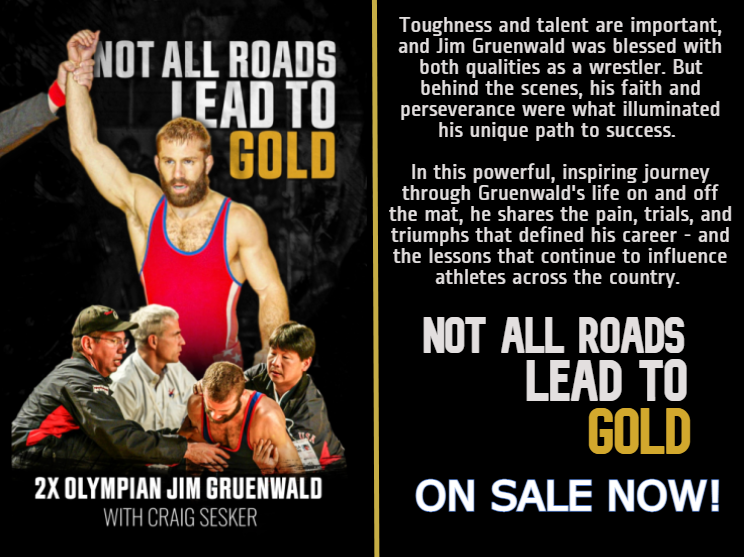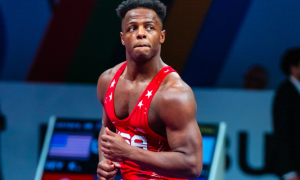The Illinois Regional Training Center is American Greco’s version of “Heavyweight U”, but it was not just the team’s big men who made a splash at the US Open last month.
At 77 kilograms, Danny Braunagel was one of three IRTC athletes to qualify for the World Team Trials Challenge Tournament, and he did so whilst navigating an exceptionally-competitive bracket. Braunagel scored an early-round victory over ’22 U23 Trials winner Justin McCunn (Viking WC), which was the obvious first salvo signaling his candidacy. A loss to National Team member Payton Jacobson (Sunkist/NTS) was then followed by a decision over Glenn Rhees (Graham Greco) and a defeat to Senior star RaVaughn Perkins (NYAC). Needing to win one match to earn entry into the aforementioned Trials, Braunagel engaged in an electrifying shootout with ’21 National champ Alec Ortiz (Minnesota Storm) and came out on top 15-10.
Zac Braunagel, whose Greco profile had been more recognizable compared to his twin brother, delivered as impressive of a showing as it could get in Vegas. The ’19 Junior World Team member downed both up-and-comer Ryan Cody and established presence Rich Carlson (Minnesota Storm) before falling to reigning two-time World Team member Alan Vera (NYAC). He would then rebound in a major way. To close out with a third-place finish, Braunagel turned back last year’s Final X runner-up Timothy Young (Army/WCAP) via technical superiority.
And of course, there are the heavyweights.
Luke Luffman, a Cadet and Junior World Team rep previously (’18 and ’21, respectively), had been out of action for an entire season prior to the US Open. A difference it did not make. Luffman was not only sharp and confident in the tournament, he was also quite effective in racking up victories against Brandon Metz (ND), Jimmy Hustoles (NMU/NTS), and Courtney Freeman (Marines). Luffman’s only defeat came at the hands of ’18 World silver Adam Coon (NYAC/Cliff Keen), a match which saw the skilled Illinois product hang in the trenches until the very end.
National Team member and ’22 Final X runner-up Tanner Farmer pounded out two opponents before meeting up with Coon for the first time in an officially-sanctioned match. They clashed in the semifinal, with Coon capitalizing on a pair of Farmer attempts to eventually snare a 5-1 decision. There was more to come. After falling to Coon, Farmer disposed of Metz and later collected third place over Luffman (the teammates did not compete against one another to decide the placing).
IRTC head coach Bryan Medlin firmly understands the landscape. The Braunagels are quickly picking up steam on the Senior circuit, as is Luffman, and Farmer has for the second straight year positioned himself for a possible run to the World Team spot. But details remain. Tactical progress in Medlin’s view is to be cultivated on a case-by-case basis according to each athlete’s individual needs, with the timing of competitions playing an additional role as it pertains to making technical adjustments.
Given that the World Team Trials Challenge Tournament is now just around the corner, the country’s most versatile (and perhaps introspective) coach has been hard at work over the past two weeks delivering to his men the messages he feels are most worth sharing. Medlin expects success, but what he desires just as much is incremental improvement towards an overall goal. The wrestlers he has under his charge at the IRTC demonstrated in Vegas that they are forces with which to be reckoned, both during this year’s selection season and well into the future.
5PM: Danny had a really encouraging tournament I thought. He lost only to two of the bracket’s better competitors, meanwhile he had come away with wins over McCunn and Ortiz, the latter of which was wild since those are the types of matches Ortiz tends to have. What was Danny’s state of mind prior to the tournament and was there anything in particular about what he did that surprised you from a technical aspect?
Coach Bryan Medlin: The thing that surprised me… Well, not “surprised me”, but what I was happy and pleased with is that there were a lot of moments when he had to show a lot of grit and bear down and fight for position, whereas before he was looking for an answer that did not involve that. Like maybe looking for a slickness or something like that. There were a couple of times in his bloodround matches when he had to get dirty and really fight. I like to see that fight from him.
Also, there is the fact that this was his first Senior tournament and I think only his second Greco tournament. Ever. He had wrestled Greco at Fargo after petitioning in and not having wrestled in the state tournament before getting here. I think he saw his brother doing well and was like, This is a sport where toughness is a factor. Well, he’s a tough guy, and I think Greco could really be something he can pursue in the future. I’m really happy with his first performance.
5PM: You know what some of these 77’s are about in this country, quite very well. It has only been a couple of weeks between events. Without giving anything away in terms of specifics, what are and have been some of the keys for Danny to close the gap?
Medlin: It’s just going to take focus and little positions in par terre. He is developing his offense on the feet and, like I said, he showed grit, toughness, and determination. I was happy with that because there had been times in his career when that was a question mark. He checked that box, now it is time to move on. It is time to keep building his arsenal to where he can score on his feet while keeping his high-intensity and delivering high-pressure matches. He does really with those types of situations.
With college athletes it can be very difficult because you spend nine or ten months out of the year really perfecting folkstyle, and Greco does have a different skill-set that you have to produce. That can be challenging in a short amount of time. I think he wrestled in the NCAA tournament on March 18th and then had to get ready for the US Open. We packed in as much par terre as we could; but hopefully over the next couple of years, and through the next Olympic cycle, he can really advance and take his results to the next level.
5PM: Zac showed that he is really close to being right there. Like, very close. He is so difficult to make vulnerable in tie-ups with pressure-releases, but is fluid enough to where he can just create some kind of motion that leads to an attack. It was par terre against Vera that did him in. In your mind, what components of his par terre defense come down to mechanics as well as how his body type relates to elongated competitors like Vera?
Medlin: Getting the idea of defense out of the way. I think par terre for him needs to be redefined as ‘I’m attacking on bottom. I’m attacking your position, I’m attacking the lock you’re trying to get… Even when you have that lock, I’m attacking each one of your footholds and throwing you off-balance.’ I think that when his mindset changes from the defensive portion to the attacking portion — even in the few times we’ve worked together since the Open — it has changed.
It is one thing to say ‘Par terre is a lot tougher at the US Open’, and it’s another to go out there and wrestle a World-class guy like Vera and have him get his lock and then you feel so helpless. It gives you a sense of urgency to put all of the pieces together of what bottom par terre means. ‘It means that I start attacking his lock all the way through to when the referee whistles it up. I’m sending a signal up to this guy that I’m too tough for you. I’m getting ahead of you, and you have to catch up to me the whole time on bottom.’ And then you have a bit of momentum getting up to your feet, which is good, too, for Zac. I think if he goes down against some of these better guys, defends, and stands up, that’s it. I mean, if I were a guy staring across from him, I’d be like, Oh no. That was his chink in the armor and now it isn’t there anymore. When he polishes that up, it’s going to be scary thing for the rest of the weight class.
5PM: What can you say about Luke? I felt like his win over Metz was both solid and important, and it was the same idea against Freeman, who despite some relative rawness can pose problems for people. He had also hung in there against Coon, which is not easy to do.
Coach Bryan Medlin: He sat out the NCAA season all year. He had an injury that nagged him, so this was his first tournament that he had wrestled in for over a year. There are always those question marks when a guy is coming back. You have practice matches, you have live wrestling in the room and things like that — but Luke did go out there and perform. He had to use some grit.
It is a two-day tournament and everyone is sore the second day, and then he had Freeman in his first match. I think it was early in the morning and that stuff is important because he is still young. It stinks that he would have had to wrestle Tanner for third. I was hoping that somehow it would not be those two. Luke is just in his first year out of Junior. He is just going to keep getting bigger and stronger, he is going to be around for a few years, and I’m really excited about his future.

Luffman (blue) entered the 2023 US Open after having been forced to miss over an entire season of competition due to injury. He ultimately went 3-1 in the tournament with his only loss coming against ’18 World silver medalist Adam Coon. (Photo: John Sachs)
5PM: Most saw the heavyweight bracket as a three-horse race between Cohlton Schultz, Coon, and Tanner, and at least with how the result ended, that’s what happened in this tournament. Tanner, who had required rest and rehab coming back from injury earlier this season, seemed comfortable in spots but that is from the outside looking in. It really came down to a pair of counter-scores for Coon in the semifinal, with Tanner attacking both times but perhaps without having enough of a positional advantage before doing so. Even though there is a lot on the line in these bouts, I was wondering if you were actually okay with it happening that way, especially since it was the Open and not the Trials.
Medlin: No, for sure. I think going out of the tournament with Tanner wrestling close matches with Schultz, he knows how close he is. If I were to be one of those two, I’d rather be Tanner, leaving there with third place knowing that you were in position to score. There were some technical things, but more of what you said, it was positional at the beginning of those attacks. His big thing is going to be pressure, and building that pressure the right way. I think he probably felt like the road to the World Championships is a little bit shorter than if he had made it to the finals but not wrestled very well. I think all things happen for a reason. Tanner got what he needed and can go into the World Team Trials with the data of having wrestled Coon once and kind of knowing what he needs to do to come out on top. So, he is going to be ready.
5PM: I’ve asked you questions like this before, but this year is a little different since there had been only one tournament in the US for Senior Greco prior to Vegas. When you have college athletes who have gotten plenty of match time, and yet have Greco full-timers who have not, how do you strike a balance in determining their work loads as well as priming them for competition?
Coach Bryan Medlin: You have to know your athletes. There are some guys who exit the college season in such a way that allows them to be a little more ready to jump two feet into the pool. And then there are some guys who if you were to do that to them, they are going to get hurt, which wouldn’t bode well for anyone. So the first thing is that you have to know your athletes.
The second thing is to do more technical work. That way, you are letting their bodies heal up a lot before you get to the Open. It is very hard in Greco-Roman to do that because a lot of Greco is fighting, being in good condition, in-shape, and things like that. But for the most part, it is hard for us to train without getting in that fight. You have to be really smart with the way you train and put your technical goals ahead of just conditioning, if only because these guys are already in great shape. I mean, both Braunagels, Luffman, Lucas (Byrd)… They were all in really good shape coming out of the NCAA season. When that is the case, you don’t really need that conditioning level. You just need to build their confidence and work in par terre.
I think bringing guys in is super-important. Zac being able to wrestle Joe Rau a bunch, Tanner was able to wrestle Luffman a bunch, we had guys for Lucas, and Danny was able to jump in that group with Joe and a couple of other guys. Zac also wrestled with Patrick Martinez a couple of times. Those are important feels. Before they go into the tournament, they understand. They at least have that under their belts, they have that confidence. They know that they have the capabilities to do great things in wrestling, and that this is just another form of that. Once they kind of get over that mental block of not being able to grab a guy’s legs, it’s not that hard.

Listen to “5PM50: Mr. Fantastic Benji Peak” on Spreaker.
Listen to “5PM49: Robby Smith on coaching, fatherhood and mentors” on Spreaker.
Listen to “5PM48: Austin Morrow and Gary Mayabb” on Spreaker.
SUBSCRIBE TO THE FIVE POINT MOVE PODCAST
iTunes | Stitcher | Spreaker | Google Play Music

Notice: Trying to get property 'term_id' of non-object in /home/fivepointwp/webapps/fivepointwp/wp-content/themes/flex-mag/functions.php on line 999

















